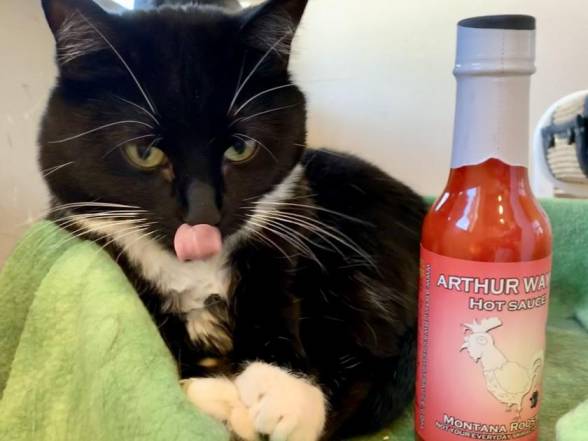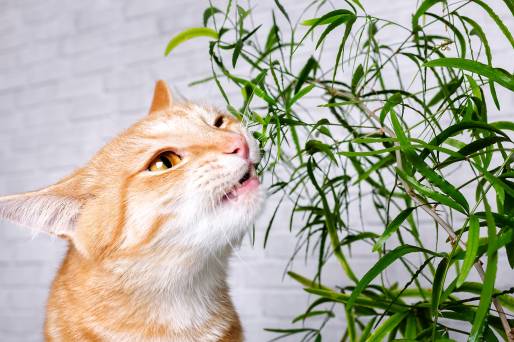
Connect with a verified veterinarian in minutes. Licensed vets are available 24/7 to answer your questions. No need to worry about your furry family member.
Do you enjoy eating spicy foods? When you’re eating spicy foods, does your cat beg for some? Many of us love to eat spicy food. You can find spicy foods in just about any type of cuisine—from Indian food and Chinese food, and more! For instance, who doesn’t love to chow down on some jalapenos from time to time? Or at least enjoy the heat of jalapenos in some queso sauce or salsa? But what happens if your cat eats some of your spicy food?
Has your cat eaten some hot sauce? Are you worried the hot sauce will make her sick? If so, then you’ve come to the right place. We understand it can be scary when our cats eat things they shouldn’t.
In this article, we’ve put together some information about hot sauce and whether or not it can make your cat sick. Let’s get started!
What is Hot Sauce?
Hot sauce can be a condiment or an ingredient in different differences. For instance, it’s used as a seasoning in chili. The sauce can be made at home or commercially. Some have said that homemade is better than the store-bought type. It just depends on your own personal tastes which kind of hot sauce you prefer!
Hot sauce is usually made with chili peppers. In many types of sauces, the peppers are the base to which other ingredients may be added. To make hotter sauces, hotter peppers are used, such as the Ghost pepper or the Habanero pepper. Other ingredients in the sauce may include vinegar, spices, mustard oil, and more. It depends on the style of hot sauce.
You may love hot sauce, but is it OK for your cat to eat it? Can hot sauce make your cat sick?
Hot Sauce & Cats
Cats should not eat hot sauce. The reason cats shouldn’t have hot sauce is that the feline digestive tract is very sensitive. A cat may be completely fine eating a rat or a dead bird without getting sick. The cat’s digestive system was made to handle these types of foods and the pathogens the prey carries. However, the feline digestive system is not set up for hot sauce or other spicy foods.
The peppers used to make the hot sauce can be mild or extremely hot, or somewhere in between. The common substance found in all peppers is capsaicin. This can wreak havoc on a cat’s digestive tract.
For one thing, the hot sauce could cause burns in the cat’s mouth and esophagus, as well as the stomach and the intestines. What’s more, some hot sauce recipes include ingredients that are toxic for cats, including garlic, onions, and more.

Review symptoms, medications & behavior to keep your pets healthy with a Vet Online in just minutes.
Ask a Vet Live NowSymptoms of Hot Sauce Ingestion in Cats
Cats that eat hot sauce may experience the following symptoms:
- Diarrhea
- Vomiting
- Nausea
- Stomach pain
- Lethargy
- Lack of appetite
If your cat shows any of these symptoms, then it’s best to call the vet. Be sure to let the vet know exactly what your cat has eaten and approximately how much of the hot sauce she ate. The vet will explain what you need to do next to help your fur baby.
It is important to note that your cat may not show any symptoms. Therefore, it is important to contact your veterinarian promptly for individual advice if your cat has eaten hot sauce.
The vet will definitely want to see your cat if she has continuous vomiting and diarrhea. In that case, the vet can provide medications that help stop these issues. They will also have medication to treat any burns in the cat’s mouth or digestive tract caused by the hot sauce.
As you can see, it’s best not to allow your cat to eat hot sauce. If she has one lick of hot sauce, she should be OK. But if your feline companion eats more hot sauce, then it’s best to call the vet.
Connect with a verified veterinarian in minutes. Licensed vets are available 24/7 to answer your questions. No need to worry about your furry family member.

Evie Moloney, RCVS
This article has been reviewed and approved by an independent Veterinarian: Evie is a vet surgeon who graduated from the University College Dublin, which is the only university offering the veterinary medicine degree in Ireland. She really enjoys surgery and has also worked as an emergency and critical care vet. She is passionate about sharing education about preventative health care for pets, especially the importance of regular dog and cat teeth brushing at home. She also enjoys helping owners find practical solutions for keeping pets as comfortable as possible while living with conditions such as arthritis. When not working, she enjoys hiking and swimming.
Review symptoms, medications & behavior to keep your pets healthy with a Vet Online in just minutes.
Ask a Vet Live Now



